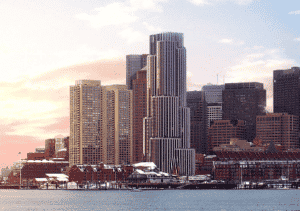Two Boston mayoral candidates and a state representative spoke against the continuing effort to rezone the downtown waterfront and the Chiofaro Co.’s Pinnacle skyscraper proposal, criticizing the development plans for insufficient climate resiliency and social equity.
“It will wall off our city from its waterfront and one of its most precious assets,” mayoral candidate Andrea Campbell, who represents District 4, said during a hearing sponsored by the state Department of Environmental Protection.
Campbell said the process which guided the rezoning – which included 40 meetings over a four-year period by an advisory committee to the Boston Planning and Development Agency – failed to reflect a broad spectrum of the city’s population.
A Suffolk Superior Court judge in April struck down the new zoning plan for 42 acres of downtown waterfront from the James F. Hook Lobster Co. property to the Boston Marriott Long Wharf hotel.
“The court decision offers a rare second chance for us to get it right,” Campbell said.
The DEP is reviewing municipal harbor plans, which set the ground rules for development near the waterfront, for dozens of Massachusetts communities in the wake of Justice Brian Davis’ ruling. Davis said the Boston central downtown waterfront harbor plan should have been approved by the state Department of Environmental Protection, rather than the Secretary of Energy and Environmental Affairs as has been the practice over the years.
If the legal issues are resolved, the project also requires BPDA approval. With the mayoral election looming this fall, the hearing also pointed to potential political obstacles to approval of the 600-foot Pinnacle skyscraper on The Chiofaro Co.’s harbor garage property under the new administration. City Councilor Michelle Wu, who is locked in a dead heat with acting Mayor Kim Janey in recent polls, also opposes the project.
Another mayoral candidate, councilor at-large Annissa Essaibi George, said the waterfront planning process should have placed more emphasis on coastal resiliency and public accessibility.
State Rep. Adrian Madaro, D-1st Suffolk District, cited increasing waterfront flooding affecting the MBTA Blue Line, including a 2018 coastal storm that shut down subway service to his East Boston district after the Aquarium station flooded downtown.
“The city has been prioritizing the wrong type of development: exclusionary and high-end projects that do not provide public benefits and access, or climate resiliency in coming decades,” Madaro said.
Commercial development group NAIOP Massachusetts urged the DEP to reinstate the harbor plans. Uncertainty about the effects of the court ruling is creating uncertainty both for developers who own waterfront property and those with projects in permitting in coastal communities, NAIOP CEO Tamara Small said in a comment letter.
“The harbor planning process is an important tool to allow communities to design waterfronts that reflect existing and future development policies and priorities to obtain significant public benefits beyond those required by the baseline regulations,” Small wrote.








